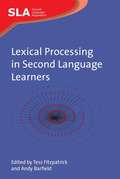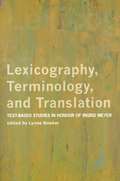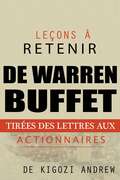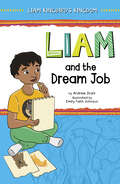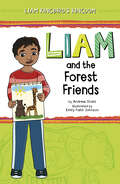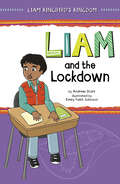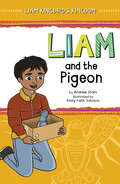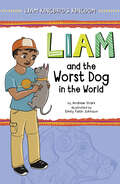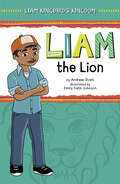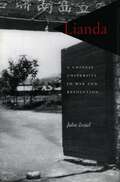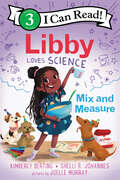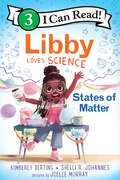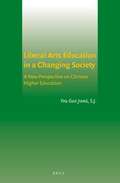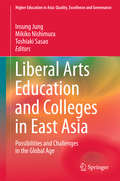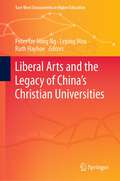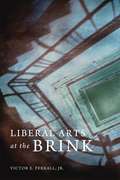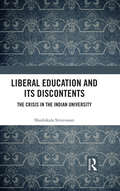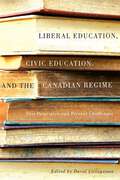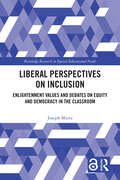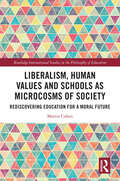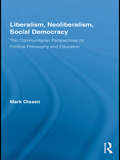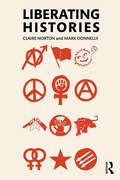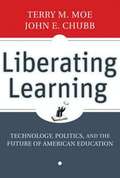- Table View
- List View
Lexical Processing in Second Language Learners
by Tess Fitzpatrick Andy BarfieldThis book presents studies from authors at the cutting edge of second language vocabulary research, whose output represents much of the current focus and direction of work in this area. The authors address various aspects of L2 lexical processing and explore different models of acquisition, processing and storage. The studies are linked by the fact that the authors have all belonged to the same dynamic and influential vocabulary acquisition research group led by Paul Meara. Alison Wray provides an overview of how Meara has led this group's research activities in an innovative PhD programme, and John Read and Paul Nation contribute a critical evaluation of Meara's wide-ranging contributions to the field of vocabulary acquisition research. The research studies presented here are relevant and replicable, offering researchers and teachers many valuable and critical insights into lexical processing in second language learners.
Lexicography, Terminology, and Translation: Text-based Studies in Honour of Ingrid Meyer
by Lynne BowkerThis volume in honour of Ingrid Meyer is a tribute to her work in the interrelated fields of lexicography, terminology and translation. One key thing shared by these fields is that they all deal with text. Accordingly, the essays in this collection are united by the fact that they too are all "text-based" in some way. In the majority of essays, electronic corpora serve as the textual basis for investigations. Chapters focusing on electronic corpora include a description of a tool that can be used to help build specialized corpora in a semi-automatic fashion; corpus-based investigations of terminological knowledge patterns, terminological implantation, lexicographic information and translation solutions; comparisons of corpora to conventional resources such as dictionaries; and analyses of corpus processing tools such as translation memory systems. In several essays, notably those dealing with historical or literary documents, the texts in question are specific manuscripts that have been studied with a view to learning more about lexicographic and translation practice. The volume is rounded out with a chapter on audiovisual translation that takes a non-conventional view of text, where "text" includes film.
Leçons à retenir des lettres aux actionnaires de Warren Buffet
by Laure Valentin Kigozi AndrewCet ouvrage éducatif présente plusieurs leçons tirées des lettres de Warren Buffet à ses actionnaires. Les leçons de ce livre concernent tous les types d'investisseurs, les étudiants en commerce de tous niveaux, les responsables de société ainsi que toutes les personnes intéressées par le sujet. Les leçons reprennent les conseils de Warren sur l'investissement (les titres et valeurs), les affaires et l'organisation idéale d'une société (sa structure). Si vous cherchez un résumé de tous les conseils en investissement pleins de sagesse que Warren Buffet a écrits pour ses actionnaires au fil des ans, ce livre est fait pour vous. Si vous cherchez un rapide aperçu instructif, ce livre est fait pour vous. J'espère que cet ouvrage vous donnera un meilleur point de vue sur l'investissement d'excellence et la gestion d'entreprise.
Liam and the Dream Job (Liam Kingbird's Kingdom)
by Andrew StarkEight-year-old Liam struggles with his school’s Career Day project in this installment from the Liam Kingbird’s Kingdom series. It’s Career Day in Mrs. Dakota’s third-grade class on the Ojibwa reservation. Unfortunately, young Liam can’t decide what he wants to be when he grows up! Can Liam figure out his future, or will his class project be an epic failure? Find out in this installment of the popular Liam Kingbird’s Kingdom series by Ojibwa author Andrew Stark. With achievable text and colorful illustrations, all books in the Liam Kingbird’s Kingdom chapter book series are perfect for early readers, grades K–3. Other Books in This Series: Liam and the Forest Friends Liam and the Lion Liam and the Lockdown Liam and the Pigeon Liam at the Powwow Liam and the Surprise Gift Liam and the Worst Dog in the World
Liam and the Forest Friends (Liam Kingbird's Kingdom)
by Andrew StarkWhen Liam hears his parents having an argument, he escapes into an imaginary world with animal friends he has drawn. His new friends help Liam understand that even when things feel out of his control, he is always safe, always loved, and a brighter day is just ahead. K–3 readers will find a friend in this series featuring quiet but strong Indigenous third-grader Liam Kingbird.
Liam and the Lockdown (Liam Kingbird's Kingdom)
by Andrew StarkDuring a school lockdown, eight-year-old Liam finds a way to calm his fears in this installment from the Liam Kingbird’s Kingdom series. Liam’s school on an Ojibwa reservation is practicing a lockdown. During the drill, the shy third grader is worried until he finds a new friend: a wooly caterpillar. Can the caterpillar help calm Liam’s nerves during the scary situation? Find out in this installment of the popular Liam Kingbird’s Kingdom series by Ojibwa author Andrew Stark. With achievable text and colorful illustrations, all books in the Liam Kingbird’s Kingdom chapter book series are perfect for early readers, grades K–3. Other Books in This Series: Liam and the Dream Job Liam and the Forest Friends Liam and the Lion Liam and the Pigeon Liam at the Powwow Liam and the Surprise Gift Liam and the Worst Dog in the World
Liam and the Pigeon (Liam Kingbird's Kingdom)
by Andrew StarkLiam and his mother find an injured pigeon, but Liam isn’t sure what to do. Aren’t pigeons kind of pests? His mother suggests they take the bird to a nature center, and Liam begins to realize that every animal, no matter what kind, deserves care, respect, and a place in our world. K–3 readers will find a friend in this series featuring quiet but strong Indigenous third-grader Liam Kingbird.
Liam and the Worst Dog in the World (Liam Kingbird's Kingdom)
by Andrew StarkLiam and his mom want to adopt a dog from the shelter. While there are many well-behaved pups to choose from, Liam notices one that’s kept away from the others—with a sign that reads "behavior issues." But Liam knows there is no such thing as a bad dog. Can some extra love and training turn the worst dog into the best? K–3 readers will find a friend in this series featuring quiet but strong Indigenous third-grader Liam Kingbird.
Liam the Lion (Liam Kingbird's Kingdom)
by Andrew StarkLiam is starting at a new school, and he is worried about making new friends. When a classmate asks about Liam’s cleft lip, Liam is afraid the boy is making fun of him. But in class that afternoon, Liam discovers that what makes him different also makes him special, and that is a reason to be proud. K–3 readers will find a friend in this series featuring quiet but strong Indigenous third-grader Liam Kingbird.
Lianda
by John IsraelIn the summer of 1937, Japanese troops occupied the campuses of Beijing’s two leading universities, Beida and Qinghua, and reduced Nankai, in Tianjin, to rubble. These were China's leading institutions of higher learning, run by men educated in the West and committed to modern liberal education. The three universities first moved to Changsha, 900 miles southwest of Beijing, where they joined forces. But with the fall of Nanjing in mid-December, many students left to fight the Japanese, who soon began bombing Changsha. In February 1938, the 800 remaining students and faculty made the thousand-mile trek to Kunming, in China’s remote, mountainous southwest, where they formed the National Southwest Associated University (Lianda). In makeshift quarters, subject to sporadic bombing by the Japanese and shortages of food, books, and clothing, students and professors did their best to conduct a modern university. In the next eight years, many of China’s most prominent intellectuals taught or studied at Lianda. This book is the story of their lives and work under extraordinary conditions. Lianda’s wartime saga crystallized the experience of a generation of Chinese intellectuals, beginning with epic journeys, followed by years of privation and endurance, and concluding with politicization, polarization, and radicalization, as China moved from a war of resistance against a foreign foe to a civil war pitting brother against brother. The Lianda community, which had entered the war fiercely loyal to the government of Chiang Kai-shek, emerged in 1946 as a bastion of criticism of China’s ruling Guomindang party. Within three years, the majority of the Lianda community, now returned to its north China campuses in Beijing and Tianjin, was prepared to accept Communist rule. In addition to struggling for physical survival, Lianda’s faculty and students spent the war years striving to uphold a model of higher education in which modern universities, based in large part on the American model, sought to preserve liberal education, political autonomy, and academic freedom. Successful in the face of wartime privations, enemy air raids, and Guomindang pressure, Lianda’s constituent universities eventually succumbed to Communist control. By 1952, the Lianda ideal had been replaced with a politicized and technocratic model borrowed from the Soviet Union.
Liar, Liar
by Barthe DeclementsGretchen Griswald thinks everything about her best friend, Susan November, is neat. Her name, her red, curly hair, her cool clothes. Actually, most of the kids in Gretchen's class are so nice that the class is given a first year teacher, Ms. Cooper. She's not much on discipline. That is, until new kid Marybelle Jackson shaves off a good part of Susan's hair with a trimmer during class. Although Gretchen and her friends are angry with Marybelle, she continues to hang around them, insisting the incident was an accident. She also seems to know a lot about what's going on around school. When Susan suddenly gets ill, it's Marybelle who tells the group that she has hepatitis. With Susan out of school for several weeks, Gretchen feels lost--but Marybelle is anxious to be friends. She tells Gretchen that she saw Susan steal a pair of earrings at the mall. Susan says they belong to her sister, but Gretchen knows that she never lets Susan borrow her things. Whom should she believe? Then Susan and her family begin to treat Gretchen strangely, as though she's a criminal. Gretchen grows increasingly more confused and depressed. She believes she has lost Susan's friendship because of another lie. But what is it? Gretchen's brother says that liars eventually trap themselves in their own webs. With his help, Gretchen weaves a plan that will divulge the truth once and for all. In a surprising twist, the liar is cleverly exposed, but the outcome--and the feelings it inspire--are not what Gretchen and her friends expect in this unforgettable slice-of-life novel.
Libby Loves Science: Mix and Measure (I Can Read Level 3)
by Kimberly Derting Shelli R. JohannesLibby loves science! In this STEM-themed Level 3 I Can Read! title, Libby and her friend Rosa learn about mixing and measuring to bake a delicious treat for a puppy party. A great choice for aspiring scientists, emerging readers, and fans of Andrea Beaty’s Ada Twist, Scientist. Includes activities, a glossary, and a cupcake recipe. Libby loves science—and experimenting! In this Level 3 I Can Read! title, Libby hosts a puppy party for her friends and their dogs. With the help of her friend Rosa and little brother, Libby decorates, stuffs goody bags and bakes delicious cupcakes. But when they realize they’ve forgotten an important ingredient, they use science to solve the problem—just in the nick of time. The Loves Science books introduce readers to girls who love science, as well as basic concepts of science, technology, engineering, and math. This Level 3 I Can Read! focuses on basic chemistry and friendship. A great pick for newly independent readers and an ideal companion to Cece Loves Science: Push and Pull.
Libby Loves Science: States of Matter (I Can Read Level 3)
by Kimberly Derting Shelli R. JohannesLibby loves science! In this STEM-themed Level 3 I Can Read! title, Libby and her friends learn about solids, liquids, and gases. A great choice for aspiring scientists, new readers, and fans of Andrea Beaty’s Ada Twist, Scientist. Includes activities, a glossary, and a fun science experiment to do at home.Libby loves science—and experimenting! In this Level 3 I Can Read! title, Libby and her classmates are excited to welcome a new student into their classroom. When the ice cream for the welcome party melts, Libby is curious to see how the three states of matter can save the celebration. Experiment with Libby and find out!The Loves Science books introduce readers to girls who love science, as well as basic concepts of science, technology, engineering, and math. This Level 3 I Can Read! explores how solids, liquids, and gases are all around us, and includes two experiments to try at home or school, as well as a glossary. A great pick for newly independent readers and an ideal companion to Cece Loves Science: Push and Pull, Libby Loves Science: Mix and Measure, Vivi Loves Science: Sink or Float, and Vivi Loves Science: Wind and Water.
Liberal Arts Education In A Changing Society: A New Perspective On Chinese Higher Education
by You Guo JiangIn Liberal Arts Education in a Changing Society: A New Perspective on Chinese Higher Education You Guo Jiang provides a unique focus on the re-emergence of liberal arts education in China.
Liberal Arts Education and Colleges in East Asia
by Insung Jung Mikiko Nishimura Toshiaki SasaoThis book discusses liberal arts education and liberal arts colleges in the context of East Asia, specifically focusing on Japan, China and S. Korea where it has become an emerging issue in higher education in recent years. It first explores the development, concepts and challenges of liberal arts education and liberal arts colleges in East Asia. It then delineates the implications of the best practices of selected liberal arts colleges inside and outside East Asia, and offers policy and pedagogical guidelines for the future of liberal arts colleges and programs in East Asia and beyond.
Liberal Arts and the Legacy of China’s Christian Universities (East-West Crosscurrents in Higher Education)
by Ruth Hayhoe Peter Tze Ming Ng Leping MouThis book brings together English translations of thirteen research papers published in recent years by Chinese historians, sociologists, and educators. These papers investigate various dimensions of the legacy of China’s historic The Christian Universities which continues to inspire higher education reform in China even in the twenty-first century.This book focuses on Christian Universities, which fostered a particularly notable Liberal Arts Education in the Chinese context. Besides embracing some ideals in common with Liberal Arts Education developed in the West, their Liberal Arts Education curriculum had an emphasis on readings in the classics, history, philosophy, religion, ethics, and literature which conveyed traditional Chinese values. The Christian Universities also shared a strong commitment to moral formation, community service, and global citizenship education. This book emphasizes Liberal Arts Education that focused on the whole person, where academic knowledge, skills, and character were equally valued. The book presents distinctive characteristics of the study of Christian higher education in China and the interplay between globalization and localization.
Liberal Arts at the Brink
by Victor E. FerrallLiberal arts colleges represent a tiny portion of the higher education market—no more than 2 percent of enrollees. Yet they produce a stunningly large percentage of America’s leaders in virtually every field of endeavor. The educational experience they offer—small classes led by professors devoted to teaching and mentoring, in a community dedicated to learning—has been a uniquely American higher education ideal. Liberal Arts at the Brink is a wake-up call for everyone who values liberal arts education. A former college president trained in law and economics, Ferrall shows how a spiraling demand for career-related education has pressured liberal arts colleges to become vocational, distorting their mission and core values. The relentless competition among them to attract the “best” students has driven down tuition revenues while driving up operating expenses to levels the colleges cannot cover. The weakest are being forced to sell out to vocational for-profit universities or close their doors. The handful of wealthy elite colleges risk becoming mere dispensers of employment and professional school credentials. The rest face the prospect of moving away from liberal arts and toward vocational education in order to survive. Writing in a personable, witty style, Ferrall tackles the host of threats and challenges liberal arts colleges now confront. Despite these daunting realities, he makes a spirited case for the unique benefits of the education they offer—to students and the nation. He urges liberal arts colleges to stop going it alone and instead band together to promote their mission and ensure their future.
Liberal Education and Its Discontents: The Crisis in the Indian University
by Shashikala SrinivasanWhat explains the peculiar trajectory of the university and liberal education in India? Can we understand the crisis in the university in terms of the idea of education underlying it? This book explores these vital questions and traces the intellectual history of the idea of education and the cluster of concepts associated with it. It probes into the cultural roots of liberal education and seeks to understand its scope, effects and limits when transplanted into the Indian context. With an extensive analysis of the philosophical writing on the idea of university and education in the West and colonial documents on education in India, the book reconstructs the ideas of Gandhi and Tagore on education and learning as a radical alternative to the inherited, European model. The author further reflects upon how we can successfully deepen liberal education in India as well as construct alternative models that will help us diversify higher learning for future generations. Lucid, extensive and of immediate interest, this book will be useful for scholars and researchers interested in the history and philosophy of education and culture, social epistemology, ethics, postcolonial studies, cultural studies and public policy.
Liberal Education, Civic Education, and the Canadian Regime: Past Principles and Present Challenges
by David W. LivingstoneReflections on the education some early Canadians thought necessary for citizenship, and contemporary threats to that education.
Liberal Perspectives on Inclusion: Enlightenment Values and Debates on Equity and Democracy in the Classroom (Routledge Research in Special Educational Needs)
by Joseph MintzProviding a theoretical underpinning for the idea of inclusion within education, this book recognizes the fundamental role political values play in our understanding of inclusion in the classroom, providing a philosophical lens on the inherent tensions that exist within sociological perspectives on social justice, equity and diversity.Chapters address value tensions from the perspective of classical liberalism and the extent to which this can be reconciled with values pluralism and Berlin’s notions of negative and positive liberty. The book argues for a re-framing of inclusion as a process of negotiation between teachers, parents, children and young people which involves a recognition of the complex tradeoffs involved in working with difference in the classroom. These tensions are explored through a series of case studies of real-world dilemmas in the classroom, ultimately serving to highlight the ways in which varying political value positions, including liberalism, are inescapably embedded within the practice in education.Considering topics such as decolonization of the curriculum, freedom of speech and social justice, this seminal volume will be highly relevant for researchers, scholars and postgraduate students in the fields of inclusive education, special educational needs, philosophy of education, social justice and education and critical theory.
Liberalism, Human Values and Schools as Microcosms of Society: Rediscovering Education for a Moral Future (Routledge International Studies in the Philosophy of Education)
by Martin CohenThis seminal volume provides an accessible overview of key ethical and philosophical debates surrounding contemporary education policy, advocating for a future in education that is primarily driven by prioritising social values.Grounded in the educational ideas of recent British liberal and philosophical thinkers, including Roger Scruton, Mary Midgley and Brenda Almond in particular, the book provides a deeper understanding of the importance of intellectual and moral freedom as it plays out in today’s schools. The book echoes Almond’s call for education to be viewed through the lens of social values and argues for a broader societal strategy to the philosophy of education than narrowly utilitarian attempts to prepare pupils for the labour market. Chapters present various debates in society that relate to liberalism, social values and utilitarianism, and ultimately encourage dialogue on the approach towards education that is necessary to create a socially adjusted, thoughtful and genuinely knowledgeable society of the future.By encouraging readers to think about the requirements of the schools of tomorrow along with their role in shaping both individual lives and society itself, this book will be of interest to scholars, postgraduate students and researchers in the fields of philosophy of education, education studies and moral and value education. Those interested in the sociology of education and citizenship studies more broadly will also benefit from the volume.
Liberalism, Neoliberalism, Social Democracy: Thin Communitarian Perspectives on Political Philosophy and Education (Routledge Studies in Social and Political Thought)
by Mark OlssenThe Credit Crunch of 2008 has exposed the fallacies of neoliberalism and its thesis of the self-regulating market, which has been ascendant in both economic theory and policy over the last 30 years. In moving beyond neoliberalism, social democratic arguments are once again coming to the fore; however, in the context of the 21st century, they will need to be theorized in relation to new global concerns. This book critically revisits the core theses of liberalism and neoliberalism that have provided philosophical support to free market economics - as enunciated in the writings of liberal political philosophers such as Friedrich von Hayek, Karl Popper and Isaiah Berlin - and seeks to expose the deficiencies of their beliefs that became hegemonic from the 1970s until the first decades of the present century. In moving beyond the formulas and mantras of liberalism, the book seeks to re-theorize social democracy and articulate a new vision of the political arrangements needed for the 21st century by reconsidering issues such as liberty, autonomy, social dependence and multiculturalism.
Liberating Histories: Truths, Power, Ethics
by Mark Donnelly Claire NortonLiberating Histories makes an original, scholarly contribution to contemporary debates surrounding the cultural and political relevance of historical practices. Arguing against the idea that specifically historical readings of the past are necessary or are compelled by the force of past events themselves, this book instead focuses on other forms of past-talk and how they function in politically empowering ways against social injustices. Challenging the authority and constraints of academic history over the past, this book explores various forms of past-talk, including art, films, activism, memory, nostalgia and archives. Across seven clear chapters, Claire Norton and Mark Donnelly show how activists and campaigners have used forms of past-talk to unsettle ‘common sense’ thinking about political and social problems, how journalists, artists, curators, filmmakers and performers have referenced the past in their practices of advocacy, and how grassroots archivists help to circulate materials that challenge the power of authorised institutional archives to determine what gets to count as a demonstrable feature of the past and whose voices are part of the ‘historical record’. Written in a lucid, accessible manner, and combining insightful critical analysis and philosophical argument with clear consideration of how different forms of past-talk influence the narration of pasts in a variety of socio-political contexts, Liberating Histories is essential reading for students and scholars with an interest in historiography and the ethical and political dimensions of the historical discipline.
Liberating Learning
by Terry M. Moe John E. ChubbPraise for Liberating Learning"Moe and Chubb have delivered a truly stunning book, rich with the prospect of how technology is already revolutionizing learning in communities from Midland, Pennsylvania to Gurgaon, India. At the same time, this is a sobering telling of the realpolitik of education, a battle in which the status quo is well defended. But most of all, this book is a call to action, a call to unleash the power of technological innovation to create an education system worthy of our aspirations and our childrens' dreams." -Ted Mitchell, CEO of the New Schools Venture Fund"As long as we continue to educate students without regard for the way the real world works, we will continue to limit their choices. In Liberating Learning, Terry Moe and John Chubb push us to ask the questions we should be asking, to have the hard conversations about how far technology can go to advance student achievement in this country." -Michelle Rhee, Chancellor of Education for the Washington, D.C. schools"A brilliant analysis of how technology is destined to transform America's schools for the better: not simply by generating new ways of learning, but also-and surprisingly-by unleashing forces that weaken its political opponents and open up the political process to educational change. A provocative, entirely novel vision of the future of American education." -Rick Hanushek, the Paul and Jean Hanna Senior Fellow at the Hoover Institution, Stanford University "Terry Moe and John Chubb, two long-time, astute observers of educational reform, see technology as the way to reverse decades of failed efforts. Technology will facilitate significantly more individualized student learning-and perhaps most importantly, technology will make it harder and harder for the entrenched adult interests to block the reforms that are right for our kids. This is a provocative, informative and, ultimately, optimistic read, something we badly need in public education." -Joel Klein, Chancellor of the New York City schools
